
Massachusetts voters approved a ballot law Tuesday giving the state auditor the explicit authority to audit the Legislature, backing a measure championed by Auditor Diana DiZoglio.
The measure grants the auditor's office the power to audit the "accounts, programs, activities and functions" of all "departments, offices, commissions, institutions" in the state, including those created by the Legislature and the Legislature itself. It also extends the auditor's authority over the income tax division of the Department of Revenue.
WATCH ANYTIME FOR FREE
Stream NBC10 Boston news for free, 24/7, wherever you are. |
DiZoglio has said the effort will make Massachusetts state government more transparent.
"I am a believer in the power of government to do amazing things — to make life better for everyone, everywhere," DiZoglio said in a statement released just before midnight. "I have seen that power first hand, but I've also seen the work that remains to build a state government that lives up to its values. Tonight's victory is an opportunity for all of us to look forward and work to make our legislature better. The people of Massachusetts want the equity, transparency and accountability that a legislative audit would bring, not because of division or partisan lines, but because of our great potential to push forward progress together."
Get updates on what's happening in Boston to your inbox. Sign up for our News Headlines newsletter.
With more than 69% of the vote in, preliminary results showed 71.5% support for the question, with 28.5% against.
Top Democrats in the House and Senate, including House Speaker Ron Mariano and Senate President Karen Spilka, have resisted efforts by DiZoglio to audit legislative operations and positioned themselves against the question.
Lawmakers say they already undergo audits from an outside firm, and that an investigation from the state auditor's office would violate the separation of powers clause of the state constitution, as the auditor's office falls under the executive branch in the state constitution.
"Consistent with how the Legislature has moved forward with every voter-approved ballot question in the past, we will consider next steps regarding how to best respect the Question 1 election results in a manner that aligns with the fundamental principles of the Massachusetts Constitution, including separation of powers," Mariano and Spilka said in a joint statement at 11:54 p.m.
At the Fairmont Copley Plaza Hotel, DiZoglio told the News Service any changes to the voter law will be "unacceptable."
"Legislative leaders have had the opportunity to come to the table to address this matter for the last year and a half and have refused to have discussions with our office," DiZoglio said. "The voters have spoken, and we certainly hope that they will respect the will of the voters. They are no longer fighting the Office of State Auditor on this, they would be fighting the voters of Massachusetts, who just made their voices heard loud and clear on this issue."
DiZoglio said she intends to return to the 77-page audit on the Legislature that her office recently released.
"It was missing a lot of information that was refused to us by the Legislature," DiZoglio said. "The plan is to go back to that audit and go back to legislative leaders for the missing information so that we can complete the audit."
DiZoglio said she's already notified Gov. Maura Healey she will be calling for a veto should lawmakers "choose to try to overturn this in an informal session." DiZoglio said she did not get a commitment from the governor.
"But I am hopeful. I do believe that the governor is interested in supporting the will of the people on this matter," DiZoglio said.
Mariano previously said DiZoglio's attempt to audit the body "violates basic separation of powers principles that the Supreme Judicial Court has called 'fundamental… to our form of government.'"
Due to the question of constitutionality, researchers have suggested that the law may end up facing a court challenge.
More on Question 1
A Tufts' Center for State Policy and Analysis report found that some legislative activities are off-limits to executive interference, even with the new law created by the passage of Question 1.
"Even if Question 1 passes, legislators will have a lot of leverage to resist investigations. They might drag their feet, refuse to comply, or use their budgetary power to handcuff or even defund the auditor’s office. If that happens, the fight may shift to the courts, where the outcome is hard to predict," the report said.
If it doesn't go to the courts or if court challenges are unsuccessful, lawmakers could try to overturn the law or take other steps to undermine it, but doing so would also appear to run counter to the will of the voters.
Legislators in 2003 repealed a 1998 voter law calling for public funding for candidates who met certain criteria, an episode that the Tufts report called a "precedent for legislative defiance."
Republican Party Chair Amy Carnevale celebrated the passage of Question 1.
"The MassGOP is pleased that Ballot Question #1 to allow the Auditor to Audit the Legislature appears to have passed by a comfortable margin," she said in a late-night statement. "The MassGOP joined with Auditor DiZoglio in favor of this common sense measure to provide accountability and greater transparency to taxpayers."



